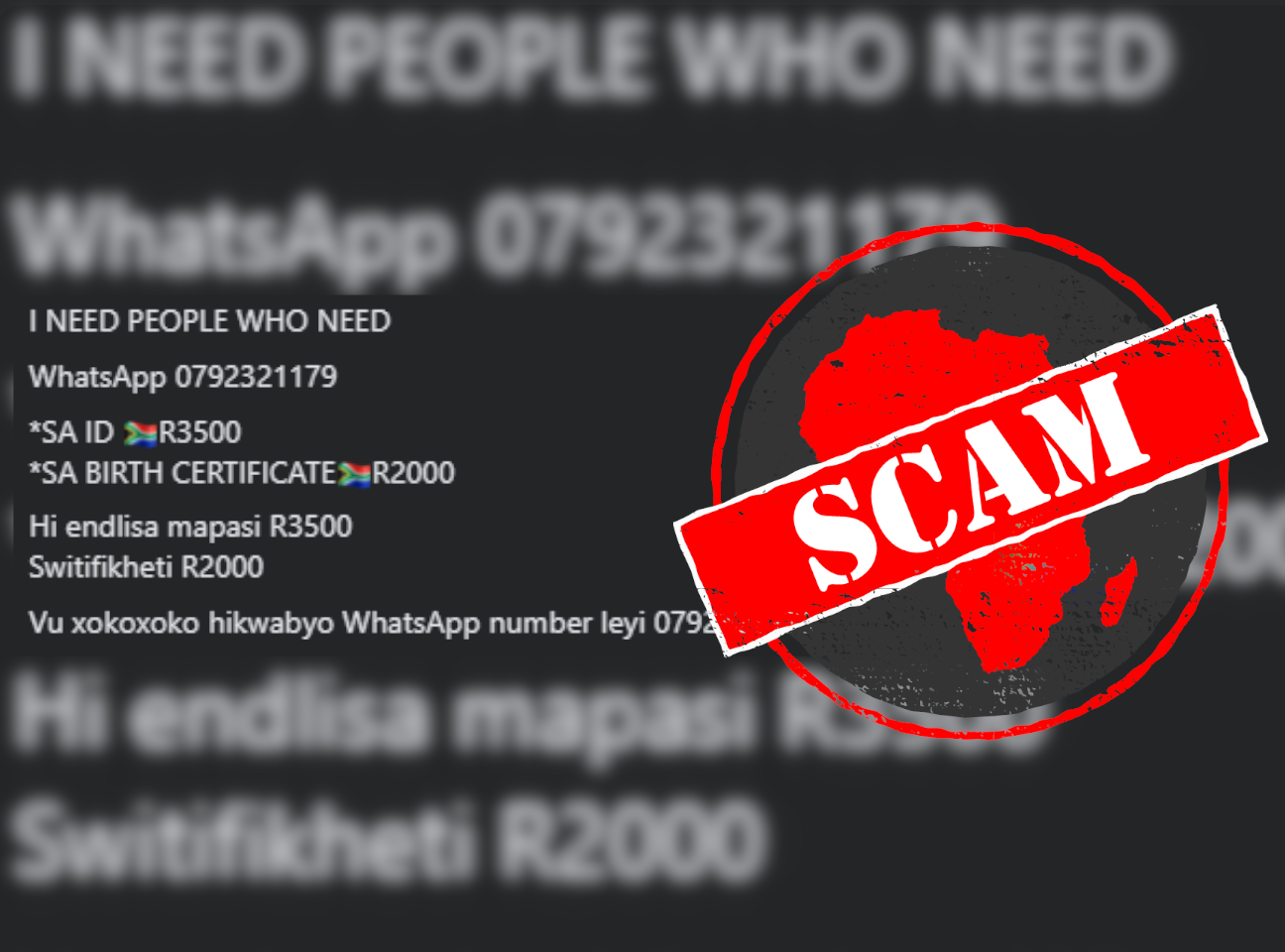IN SHORT: Several Facebook users claim they can assist those struggling to obtain identity documents, birth certificates and other documents in South Africa. But be warned, their false promises come with a hefty price tag.
“Good morning ! We are looking for people who are struggling with SA ID and birth certificates,” reads a post published on a South African Facebook group with over 294,000 followers.
The poster responds to users in the comments section and encourages them to make contact via WhatsApp.
Similar offers have been posted on public Facebook groups with thousands of members here, here, here, here, here and here.
But can the account and its offers be trusted? We checked.

How to get an identity document and birth certificate in South Africa
The Department of Home Affairs (DHA) keeps records of everyone living in the country. It also issues them with the necessary documents, including birth certificates and identity documents (IDs).
“All children born in South Africa must be registered within 30 days of their birth … Once the child’s birth has been registered, an unabridged birth certificate is issued free of charge, usually a day or so after the registration application has been submitted,” the department says.
The department works with health facilities across the country to issue the certificates shortly after birth.
Late registration of birth can still be done after 30 days and a birth certificate will be issued.
DHA started issuing unabridged birth certificates in March 2013, in an effort to better protect children within the country. The department said the upgraded certificates were “more secure and reliable with added information as it contains particulars of both parents, where possible, and their identity document numbers”.
Anyone aged 16 years or older can apply for an ID at any DHA branch, online via the eHomeAffairs website or at selected bank branches across the country.
IDs are issued free of charge to first-time applicants. Older green bar-coded IDs and newer “smart cards” are valid forms of identification. The smart cards come with “microchips embedded with biometric security features”. These features are designed to make the cards harder to forge.
Signs of a scam
Africa Check reached out to the Facebook user via the WhatsApp number provided in the comments section of the post. The WhatsApp account was named “Department of Home Affairs” and its profile picture was the South African coat of arms.
The use of the department’s name and the coat of arms may have been an attempt to make the account appear legitimate and affiliated with the department and government.
We pretended to need an ID and were told that this could be arranged. We were told to provide our name, gender, date and place of birth, and a photo of our signature. Two more photos were requested: a headshot, and another of both our hands showing our fingerprints.
Giving out such sensitive information could be used for identity theft or criminal activity. Our signature could also be copied and used without our knowledge and consent.
The whole process would cost us R4,500 (about US$241), to be paid into a bank account provided. Once the ID was ready, we were told it would be sent through a retailer’s parcel delivery service.
But IDs are issued for free to first-time applicants. It should only cost you R140 to replace a lost, stolen or damaged ID. Charging R4,500 for an ID is the biggest red flag about this process.
DHA asks applicants to collect their IDs at home affairs branches; they’re not couriered.
The number on the Facebook post also doesn’t match any of those listed on the DHA website.
We also noticed that the Facebook account only posted the offers in public groups, not on its timeline.
All signs point to a fake account with scam offers.
For more help spotting social media scams, read our guide to Facebook scams and how to spot them.
Republish our content for free
For publishers: what to do if your post is rated false
A fact-checker has rated your Facebook or Instagram post as “false”, “altered”, “partly false” or “missing context”. This could have serious consequences. What do you do?
Click on our guide for the steps you should follow.
Publishers guideAfrica Check teams up with Facebook
Africa Check is a partner in Meta's third-party fact-checking programme to help stop the spread of false information on social media.
The content we rate as “false” will be downgraded on Facebook and Instagram. This means fewer people will see it.
You can also help identify false information on Facebook. This guide explains how.





Add new comment